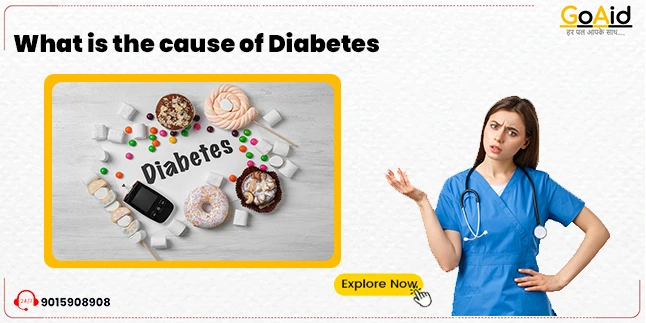We all have heard of one saying Prevention is Better than Cure. India is suffering from diabetes with more than 7 & a half Cr people. This state is released by the World Health Organization & can be trusted. But there is a big question, what is the cause of Diabetes? However, this question can be formed as What are the causes of Diabetes?
Because, once we get to know about those causes, we can prevent ourselves from diving into those causes & save ourselves from Diabetes. And yes, this is possible.
This is why, in this blog, we have added those points that will help us to know of causes of diabetes. After reading this blog, youŌĆÖll be able to know about those causes that may /can lead you to dive into a bog of this diabetes.
So, letŌĆÖs start-
What are the Causes of Diabetes?
Indeed there are many Causes of Diabetes. However, it would not be considered a great step to call any single cause the major cause of diabetes. This is why, we have added the Top 20 Causes of Diabetes below:
1. Genetic Predisposition
Individuals with a family history of diabetes often inherit a genetic predisposition that can affect the way their bodies produce and use insulin, increasing the risk of developing diabetes over time.
2. Insulin Resistance
Insulin resistance occurs when cells in the body become less responsive to the effects of insulin. This means that glucose is not efficiently transported into cells, leading to elevated blood sugar levelsŌĆöa hallmark of diabetes.
3. Unhealthy Lifestyle Choices
Poor dietary habits, characterized by excessive consumption of refined sugars and unhealthy fats, coupled with a sedentary lifestyle, contribute to obesity and insulin resistance. The resulting imbalance in blood sugar regulation heightens the risk of diabetes.
4. Autoimmune Factors
In cases of Type 1 diabetes, an autoimmune response mistakenly targets and destroys insulin-producing beta cells in the pancreas. Without these cells, the body cannot produce enough insulin, leading to uncontrolled blood sugar levels.
5. Age and Ethnicity
Advancing age is associated with a natural decline in insulin sensitivity. Additionally, certain ethnic groups have a higher genetic predisposition to diabetes. Factors such as genetic variations and lifestyle differences within these groups contribute to varying diabetes risks.
6. Gestational Factors
During pregnancy, hormonal changes can lead to insulin resistance. If the pancreas cannot produce enough insulin to compensate, gestational diabetes may develop, increasing the risk of Type 2 diabetes later in life.
7. Pancreatic Issues
Diseases or damage to the pancreas, such as pancreatitis, can disrupt insulin production. Without sufficient insulin, the body struggles to regulate blood sugar levels effectively, contributing to diabetes.
8. Hormonal Changes
Certain hormonal conditions, like polycystic ovary syndrome (PCOS), can contribute to insulin resistance, particularly in women. The resulting imbalance in blood sugar regulation increases the risk of Type 2 diabetes.
9. High Blood Pressure
Hypertension is often associated with diabetes. Elevated blood pressure can damage blood vessels and impair the delivery of oxygen and nutrients, exacerbating the complications associated with diabetes.
10. Medication-Induced Diabetes
Some medications, such as certain antipsychotics and corticosteroids, can induce insulin resistance, leading to diabetes. Understanding and monitoring the side effects of medications is crucial for individuals at risk.
Also Read: Exploring the Cost of Dead Body Freezer Box Rentals in Delhi: Budgeting for Your Needs
11. Chronic Stress
Prolonged exposure to stress can trigger the release of stress hormones, impacting insulin sensitivity and potentially leading to elevated blood sugar levels.
12. Inactivity and Sedentary Lifestyle
Lack of physical activity contributes to obesity and insulin resistance. Regular exercise helps improve insulin sensitivity, aiding in the prevention and management of diabetes.
13. Poor Sleep Quality
Insufficient or poor-quality sleep can disrupt the body’s hormonal balance, affecting insulin sensitivity and glucose metabolism, thereby increasing the risk of diabetes.
14. Environmental Factors
Exposure to certain environmental pollutants and toxins may contribute to the development of diabetes by affecting the endocrine system and insulin regulation.
15. Inflammatory Conditions
Chronic inflammatory conditions, such as rheumatoid arthritis or inflammatory bowel disease, may promote insulin resistance, escalating the risk of diabetes.
16. Dietary Sugars and Carbohydrates
Diets high in refined sugars and carbohydrates can lead to rapid spikes in blood sugar levels, straining the body’s ability to produce and utilize insulin effectively.
17. Excessive Alcohol Consumption
Heavy alcohol intake can disrupt blood sugar levels, affecting the liver’s ability to regulate glucose and increasing the risk of insulin resistance.
18. Abdominal Fat Distribution
Central obesity, or carrying excess weight around the abdomen, is linked to insulin resistance. The fat cells in this area release substances that can interfere with insulin’s action.
19. Hormonal Changes During Puberty and Menopause
Hormonal fluctuations during puberty and menopause can affect insulin sensitivity, potentially contributing to the development of diabetes.
20. Certain Infections
Viral infections, such as those caused by certain strains of the enterovirus, have been associated with an increased risk of developing Type 1 diabetes, particularly in individuals with a genetic predisposition.
Conclusion
In conclusion, the causes of diabetes are diverse and interconnected, involving genetic predisposition, lifestyle choices, hormonal fluctuations, and environmental influences. Recognizing these multifaceted factors is pivotal for proactive prevention and effective management.
Lifestyle modifications, including a balanced diet, regular exercise, and stress management, emerge as critical pillars in reducing the risk of diabetes. Regular health check-ups and awareness of individual risk factors are imperative for early detection and intervention.
As we navigate the complex landscape of diabetes causation, a holistic and personalized approach, encompassing both genetic and environmental considerations, is essential for fostering a healthier future and minimizing the global burden of this prevalent chronic condition.
Also Read: Cost Of Dead Body Freezer Services: Complete Guide















